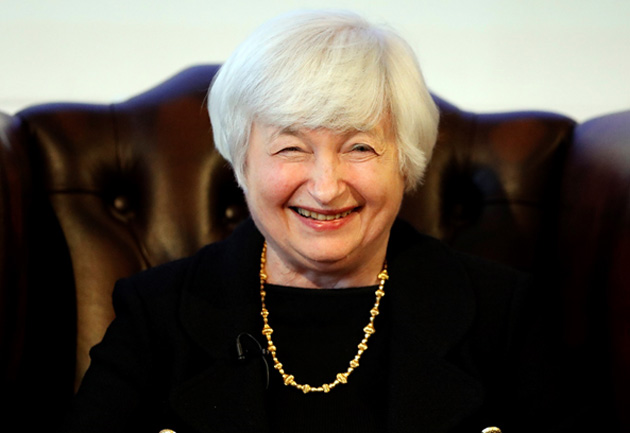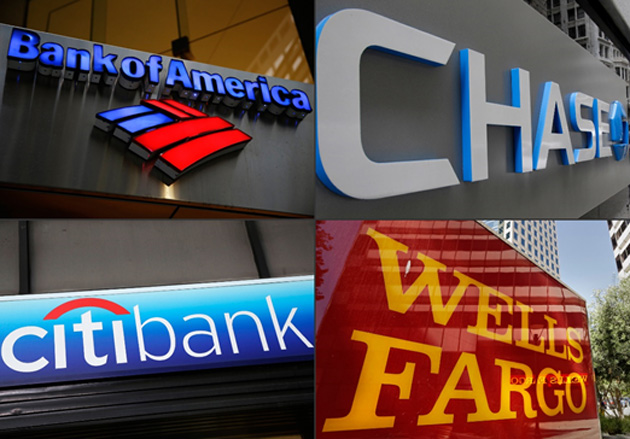Top central bankers choose their words carefully. They know sending the wrong signals can unleash havoc, and they’ll get blamed for it. More important, as masters in acrobatic flip-flopping and backpedaling, they rarely promise a specific outcome.
So when a Fed official does say anything definitive, I pay attention—because it’s almost never an accident.
Last week, I did a double take when I saw this Reuters headline:
That’s an unusually bold statement for any Fed leader, much less the chair.
It sure would be nice if Yellen were right. We’d all go to our graves (hopefully not too soon) without ever having seen another financial crisis.
Not so fast, though. Let’s see exactly what Yellen meant, and what it means for your investment strategy.

Photo: AP
“We’re Much Safer”
Here is the Reuters lead:
U.S. Federal Reserve Chair Janet Yellen said on Tuesday that she does not believe that there will be another financial crisis for at least as long as she lives, thanks largely to reforms of the banking system since the 2007-09 crash.
"Would I say there will never, ever be another financial crisis?" Yellen said at a question-and-answer event in London.
"You know probably that would be going too far, but I do think we're much safer, and I hope that it will not be in our lifetimes and I don't believe it will be," she said.
This was a head-scratcher to me. While it wasn’t a prepared text, Yellen would still never say anything like this by accident.
It seemed as if she wanted to say it and was looking for an opportunity to do so. We found out why the next day.

Photo: AP
Banks Pass the Test
Last Wednesday, the Fed released the second half of the results of its annual bank stress tests. All 34 top US banks passed—for the first time since the post-2008 crisis reforms took effect.
In practical terms, that means the banks can distribute more capital to shareholders as dividends and stock buybacks.
Which is weird when you think about it. The Fed says the banks are safe, so now they are free to make themselves less safe by reducing their capital buffers. The six largest banks got permission to distribute about $100 billion.
Naturally, bank shareholders had a ball, but whether it’s good for the system is another question. It means the next crisis bailout of those banks, if one happens, will be $100 billion larger.
Oh, but wait.
There won’t be another bailout! Because, remember, the Fed chief herself said there won’t be another crisis in our lifetimes.
It looks like Yellen’s answer to that question was a planned signal to the banks: Go ahead and pay those dividends. We’re off your backs now.

Photo: AP
Spring Cleaning
As I said, it would be great if Yellen were right and we could avoid another financial crisis—but I’m not going to bet on it.
In fact, her predecessor, Ben Bernanke, was becoming a laughing stock among professional investors during his time in office, because everyone agreed that he made the best contrarian indicator they’d ever seen.
If Bernanke said there was no housing bubble, better take your money out of mortgage-backed securities immediately. If Bernanke said the economy was stable, better watch out below for falling rocks.
If Yellen is anything like Bernanke, her uncommonly daring statement could mean that we are getting closer to another stock market crash and recession.
US markets already look shaky. Even if the banks are okay, many other things could trigger a crisis.
One thing that scares me is the increasing concentration of gains in a handful of technology stocks. Some of those companies are legitimate champions, but they can’t carry the whole market higher. Problems in any of them could easily make it drop, though.
Then there’s the Fed with its fixation on raising rates despite slow growth, which could easily set off a deflationary recession. Not good for growth stocks or real estate.
To reduce our exposure to this particular house of cards, I’ve been looking outside the US for new investment opportunities.
In my Yield Shark income investing service, subscribers are holding…
- A European transport stock that should benefit from changing trade flows and pays close to 6% in dividends.
- An emerging-markets fund that filters out the high-risk, high-volatility players and holds only stable stocks poised for steady growth.
- A global natural resources fund that generates option income from commodity-producing stocks around the world.
I also look for ways to stay in the US with reduced risk. You can do this by moving up the capital structure to own preferred stocks, as well as quality-screened dividend payers from defensive sectors.
(If you want to know more, consider trying Yield Shark risk-free for 90 days, with full money-back guarantee. Click here to get started.)

Photo: AP
Watch Those Dollars
In an ideal world, we wouldn’t have to worry about unstable banks. We wouldn’t have to deconstruct central bankers’ statements. We might not even have central banks.
Instead, to paraphrase Don Rumsfeld, we must trade the markets we have, not the ones we wish we had.
Hiding in cash, or gold, or whatever you think is a safe haven, is probably not the best move either. This is no time to put all your money on one horse, no matter how safe it looks.
Far better to find stable, income-producing assets that align with the macro trends. It’s more work, but pays off in time.
Disclosure: Follow Mauldin as he uncovers the truth behind, and beyond, the financial headlines in his free publication, Thoughts ...
more
Disclosure: Follow Mauldin as he uncovers the truth behind, and beyond, the financial headlines in his free publication, Thoughts from the Frontline. The publication explores developments overlooked by mainstream news to help you understand what’s happening in the economy and navigate the markets with confidence.
Copyright 2016. Follow John Mauldin on Twitter.
To subscribe to John Mauldin's Thoughts from the Frontline e-newsletter and a selection of other free newsletters, please click here:& ;
http://www.mauldineconomics.com/subscribe
Thoughts From the Frontline and MauldinEconomics.com is not an offering for any investment. It represents only the opinions of John Mauldin and those that he interviews. Any views expressed are provided for information purposes only and should not be construed in any way as an offer, an endorsement, or inducement to invest and is not in any way a testimony of, or associated with, Mauldin's other firms. John Mauldin is the Chairman of Mauldin Economics, LLC. He also is the President and registered representative of Millennium Wave Advisors, LLC MWA which is an investment advisory firm registered with multiple states, President and registered representative of Millennium Wave Securities, LLC, (MWS) member FINRA and SIPC, through which securities may be offered. MWS is also a Commodity Trading Advisor (CTA) registered with the CFTC, as well as an Introducing Broker (IB) and NFA Member. Millennium Wave Investments is a dba of MWA LLC and MWS LLC. This message may contain information that is confidential or privileged and is intended only for the individual or entity named above and does not constitute an offer for or advice about any alternative investment product. Such advice can only be made when accompanied by a prospectus or similar offering document. Past performance is not indicative of future performance. Please make sure to review important disclosures at the end of each article. Mauldin companies may have a marketing relationship with products and services mentioned in this letter for a fee.
Note: Joining The Mauldin Circle is not an offering for any investment. It represents only the opinions of John Mauldin and Millennium Wave Investments. It is intended solely for investors who have registered with Millennium Wave Investments and its partners at www.MauldinCircle.com (formerly AccreditedInvestor.ws) or directly related websites. The Mauldin Circle may send out material that is provided on a confidential basis, and subscribers to the Mauldin Circle are not to send this letter to anyone other than their professional investment counselors. Investors should discuss any investment with their personal investment counsel. John Mauldin is the President of Millennium Wave Advisors, LLC MWA, which is an investment advisory firm registered with multiple states. John Mauldin is a registered representative of Millennium Wave Securities, LLC, (MWS), an FINRA registered broker-dealer. MWS is also a Commodity Trading Advisor (CTA) registered with the CFTC, as well as an Introducing Broker (IB). Millennium Wave Investments is a dba of MWA LLC and MWS LLC. Millennium Wave Investments cooperates in the consulting on and marketing of private and non-private investment offerings with other independent firms such as Altegris Investments; Capital Management Group; Absolute Return Partners, LLP; Fynn Capital; Nicola Wealth Management; and Plexus Asset Management. Investment offerings recommended by Mauldin may pay a portion of their fees to these independent firms, who will share 1/3 of those fees with MWS and thus with Mauldin. Any views expressed herein are provided for information purposes only and should not be construed in any way as an offer, an endorsement, or inducement to invest with any CTA, fund, or program mentioned here or elsewhere. Before seeking any advisor's services or making an investment in a fund, investors must read and examine thoroughly the respective disclosure document or offering memorandum. Since these firms and Mauldin receive fees from the funds they recommend/market, they only recommend/market products with which they have been able to negotiate fee arrangements.
PAST RESULTS ARE NOT INDICATIVE OF FUTURE RESULTS. THERE IS RISK OF LOSS AS WELL AS THE OPPORTUNITY FOR GAIN WHEN INVESTING IN MANAGED FUNDS. WHEN CONSIDERING ALTERNATIVE INVESTMENTS, INCLUDING HEDGE FUNDS, YOU SHOULD CONSIDER VARIOUS RISKS INCLUDING THE FACT THAT SOME PRODUCTS: OFTEN ENGAGE IN LEVERAGING AND OTHER SPECULATIVE INVESTMENT PRACTICES THAT MAY INCREASE THE RISK OF INVESTMENT LOSS, CAN BE ILLIQUID, ARE NOT REQUIRED TO PROVIDE PERIODIC PRICING OR VALUATION INFORMATION TO INVESTORS, MAY INVOLVE COMPLEX TAX STRUCTURES AND DELAYS IN DISTRIBUTING IMPORTANT TAX INFORMATION, ARE NOT SUBJECT TO THE SAME REGULATORY REQUIREMENTS AS MUTUAL FUNDS, OFTEN CHARGE HIGH FEES, AND IN MANY CASES THE UNDERLYING INVESTMENTS ARE NOT TRANSPARENT AND ARE KNOWN ONLY TO THE INVESTMENT MANAGER. Alternative investment performance can be volatile. An investor could lose all or a substantial amount of his or her investment. Often, alternative investment fund and account managers have total trading authority over their funds or accounts; the use of a single advisor applying generally similar trading programs could mean lack of diversification and, consequently, higher risk. There is often no secondary market for an investor's interest in alternative investments, and none is expected to develop. You are advised to discuss with your financial advisers your investment options and whether any investment is suitable for your specific needs prior to making any investments.
All material presented herein is believed to be reliable but we cannot attest to its accuracy. Opinions expressed in these reports may change without prior notice. John Mauldin and/or the staffs may or may not have investments in any funds cited above as well as economic interest. John Mauldin can be reached at 800-829-7273.
less







